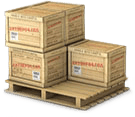What is BREXIT?
BRitain EXITing the EU.
The EU is an economic and political union involving 28 European countries. It allows free trade and free movement of people to live and work in whichever country they choose.
The UK joined in 1973 (when it was known as the European Economic Community).
A public vote – or referendum – was held on Thursday 23 June 2016, to decide whether the UK should leave or remain.
Leave won by 52% to 48%. The referendum turnout was very high at 72%, with more than 30 million people voting – 17.4 million people opting for Brexit.
And how could it affect me?
In the first instance the contents of your shopping basket may change. Almost 30% of our food comes from the EU and it is likely that some foods, such as fresh vegetables and fruit, will become more scarce and more expensive. Plus key ingredients for food made in the UK may be in shorter supply. Supermarkets have warned of empty shelves and the inevitable higher prices.
Electricity and gas prices may go up not only due to a fall in the value of the pound against the Euro but also as a result of cutting ties with EU energy markets.
Travelling to and from the EU wouldn’t change that much but passports would be required to have a minimum of 6 months validity for your return journey. Existing European health cover and insurance would like become invalid so you’d need to source appropriate travel insurance with healthcare cover. For driving in the EU you’d need some extra documents – a green card which proves your insurance provides the minimum required cover, a GB sticker and for some countries an International Driving Permit. If travelling with pets then the existing pet passport scheme would be invalid with different processes including a number of lengthy vets tests would be required.
And that’s just the tip of the iceberg – then there’s delays at airports and ports, VAT, tax, medication, mortgages, mobile phones, pensions, interest rates, benefit payments etc…
But you’re here for advice on IMPORTING or EXPORTING, or both.



